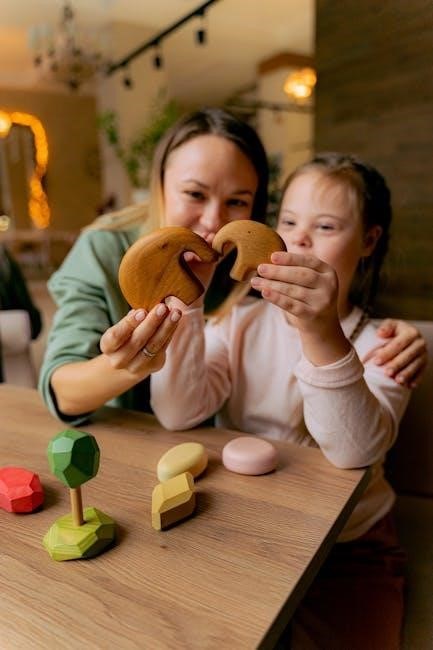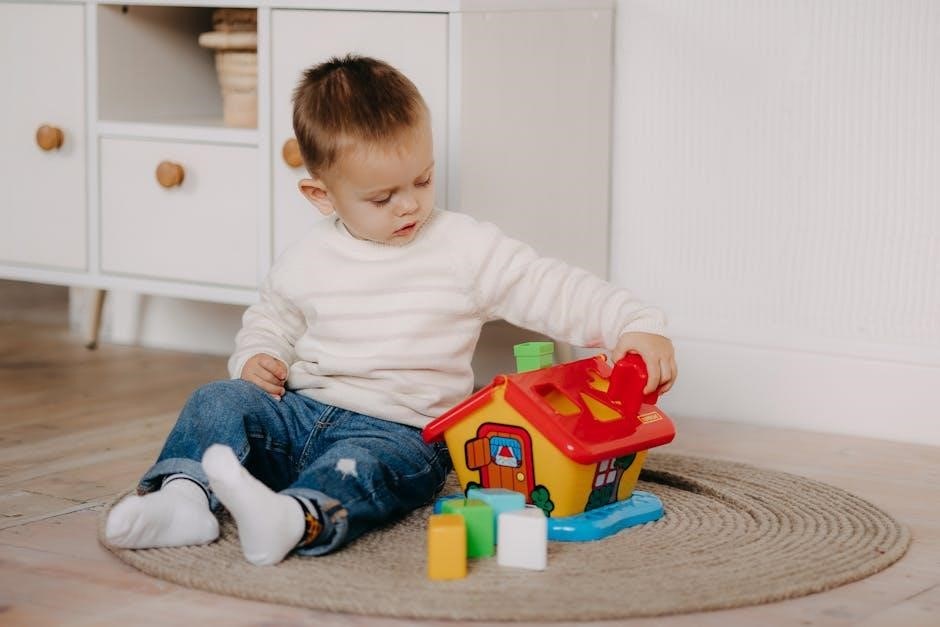happiness: a guide to developing life’s most important skill

What Is Happiness and Why Is It Important?
Happiness is a skill developed through effort‚ leading to lasting fulfillment and well-being. It involves cultivating joy‚ purpose‚ and compassion‚ contributing to a meaningful‚ joyful life.
Defining Happiness: Temporary vs. Lasting Fulfillment
Happiness can be understood as both temporary joy and lasting fulfillment. Temporary happiness often stems from external sources‚ like material possessions or fleeting experiences‚ providing momentary satisfaction. Lasting fulfillment‚ however‚ arises from within‚ rooted in personal growth‚ meaningful relationships‚ and a sense of purpose. While temporary happiness fades‚ lasting fulfillment is cultivated through effort‚ mindfulness‚ and alignment with one’s values‚ leading to a deeper‚ enduring state of well-being and life satisfaction;
The Role of Happiness in Overall Well-Being

Happiness plays a pivotal role in overall well-being by enhancing mental‚ emotional‚ and physical health. It strengthens resilience‚ fostering better coping mechanisms and emotional stability. Happy individuals often experience improved relationships‚ increased productivity‚ and a stronger immune system. Moreover‚ happiness contributes to a sense of purpose and fulfillment‚ creating a positive feedback loop that reinforces well-being. Thus‚ cultivating happiness is essential for living a balanced and fulfilling life‚ benefiting both individuals and those around them.

The Science Behind Happiness
Happiness is rooted in brain chemistry‚ with neurotransmitters like serotonin and dopamine playing key roles. Yale’s research highlights that happiness skills‚ such as gratitude‚ can be cultivated and strengthened through practice‚ leading to a more fulfilling life.
Key Findings from Yale University’s Happiness Course
Yale’s Happiness Lab reveals that happiness is a skill that can be cultivated. Practices like gratitude‚ mindfulness‚ and kindness significantly boost well-being. The course emphasizes that focusing on others and building strong relationships enhances happiness. It also highlights that small‚ consistent efforts‚ rather than grand gestures‚ lead to lasting fulfillment. By understanding and applying these principles‚ individuals can develop a more joyful and purposeful life‚ aligning with the course’s core mission to empower people with actionable strategies for sustained happiness.
Understanding Brain Chemistry and Neurotransmitters

Happiness is deeply rooted in brain chemistry‚ with neurotransmitters like serotonin‚ dopamine‚ and endorphins playing key roles. These chemicals influence mood‚ satisfaction‚ and joy. Practices such as exercise‚ meditation‚ and social connections boost their production. For instance‚ dopamine is linked to pleasure and reward‚ while serotonin stabilizes mood. By understanding how these neurotransmitters function‚ individuals can adopt practices that enhance their levels‚ fostering a chemically supported path to sustainable happiness and emotional resilience.
Practices for Cultivating Happiness
Cultivating happiness involves practices like gratitude journals‚ mindfulness‚ and meditation‚ which help rewire the brain to focus on joy and foster emotional resilience and well-being.
The Power of Gratitude Journals
Maintaining a gratitude journal is a simple yet powerful practice that helps rewire the brain to focus on positivity. By documenting daily moments of joy or appreciation‚ individuals train their minds to recognize and cherish life’s small pleasures. This habit fosters emotional well-being‚ resilience‚ and a deeper sense of fulfillment. Over time‚ it cultivates a mindset that naturally seeks happiness‚ even in challenging circumstances‚ leading to sustainable life satisfaction and inner peace.
Mindfulness and Meditation Techniques
Mindfulness and meditation are powerful tools for cultivating happiness. These practices involve being fully present in the moment‚ observing thoughts without judgment. Regular mindfulness meditation reduces stress and anxiety‚ enhancing emotional well-being. By training the mind to focus on the present‚ individuals can break free from negative thought patterns and develop a greater appreciation for life’s simple joys‚ leading to lasting peace and contentment. These techniques empower individuals to create a stable foundation for sustainable happiness in daily life.

Overcoming Obstacles to Happiness
Addressing negative thoughts and emotional barriers is essential for achieving lasting happiness. By cultivating resilience and practicing mindfulness‚ individuals can overcome obstacles and find inner peace.

Addressing Negative Thoughts and Emotional Barriers
Negative thoughts and emotional barriers often hinder happiness. Mindfulness and cognitive restructuring can help reframe unhelpful patterns. Practicing compassion and self-compassion fosters emotional resilience. Recognizing impermanence and cultivating gratitude shifts focus to the present. By addressing these obstacles‚ individuals can create a mindset conducive to lasting well-being and joy‚ aligning with Matthieu Ricard’s teachings on developing happiness as a skill.
Coping with Stress and Adversity
Coping with stress and adversity requires resilience and mindful strategies. Practices like meditation and gratitude help manage stress. Matthieu Ricard emphasizes that happiness is a skill developed through training the mind. Accepting impermanence and cultivating compassion foster emotional strength. By reframing challenges as opportunities for growth‚ individuals can navigate adversity while maintaining well-being and joy‚ aligning with principles from “The Happiness Lab” and Ricard’s teachings on sustainable happiness.

Living a Purposeful Life
Living a purposeful life involves discovering your passion and aligning actions with core values. It fosters fulfillment and contributes to overall happiness‚ as emphasized by Matthieu Ricard.
Discovering Your Ikigai: Finding Meaning and Purpose
Discovering your ikigai‚ a Japanese concept meaning “reason for being‚” involves finding the intersection of passion‚ mission‚ profession‚ and vocation. It is about identifying activities that bring fulfillment and purpose. Matthieu Ricard emphasizes that purposefulness leads to sustainable happiness. Ikigai helps individuals align their actions with their values‚ fostering a sense of direction and meaning. This alignment is crucial for achieving lasting fulfillment and contributing to overall well-being‚ as highlighted in guides on developing life’s most important skills.
The Role of Compassion and Kindness
Compassion and kindness are essential elements of happiness‚ fostering emotional well-being and meaningful connections. Matthieu Ricard‚ a Buddhist monk‚ highlights that these qualities cultivate inner fulfillment. Practicing compassion involves empathy and acting selflessly‚ which enriches both personal and interpersonal experiences; Kindness fosters joy and strengthens relationships‚ contributing to a sense of purpose. Together‚ they create a foundation for sustainable happiness and a fulfilling life‚ as emphasized in guides on developing life’s most important skills.

The Importance of Self-Care
Self-care is vital for sustainable happiness‚ involving physical well-being‚ mental health practices‚ and personal time to recharge‚ ensuring a balanced and fulfilling life.
Physical Well-Being and Its Impact on Happiness
Physical well-being significantly influences happiness by reducing stress and improving mood. Regular exercise releases endorphins‚ enhancing mental health. A balanced diet and sufficient sleep further support emotional resilience‚ creating a foundation for sustained joy and vitality‚ essential for a fulfilling life.
Mental Health Practices for Sustainable Happiness
Mental health is crucial for sustainable happiness‚ involving practices like mindfulness and meditation. These techniques reduce stress and anxiety‚ fostering emotional balance. Cultivating gratitude and positive thinking reshapes mindset‚ promoting resilience and joy. Prioritizing mental well-being ensures a stable foundation for long-term happiness and overall life satisfaction.

Building Strong Relationships
Building strong relationships is vital for happiness‚ fostering trust‚ empathy‚ and mutual support. They enhance emotional well-being and create a supportive network‚ essential for a fulfilling life.
The Role of Social Connections in Happiness
Social connections play a crucial role in happiness by fostering trust‚ empathy‚ and a sense of belonging. Strong relationships provide emotional support‚ shared joy‚ and collective problem-solving‚ reducing stress and enhancing resilience. Meaningful interactions with others encourage personal growth and contribute to a fulfilling life‚ as they help develop essential life skills like communication and understanding others’ perspectives.
Nurturing Relationships and Building Support Systems
Nurturing relationships involves active listening‚ empathy‚ and consistent effort to connect deeply with others. Building support systems requires fostering trust‚ reliability‚ and open communication. These connections provide emotional strength‚ reduce feelings of isolation‚ and create opportunities for shared joy and growth. Strong relationships and support systems are essential for long-term happiness‚ as they offer a foundation for resilience and a sense of belonging in life.

Sustaining Happiness Over Time
Sustaining happiness requires continuous effort‚ adaptability‚ and resilience. By embracing lifelong learning and evolving strategies‚ individuals can maintain well-being amid life’s changing circumstances and challenges.
Continuous Learning and Personal Growth
Continuous learning and personal growth are vital for sustaining happiness. By acquiring new skills and expanding knowledge‚ individuals foster resilience and adaptability. This ongoing process allows them to adapt to life changes‚ maintain a sense of purpose‚ and continuously evolve. Learning keeps the mind active‚ preventing stagnation and promoting a fulfilling life. It encourages self-improvement and helps individuals stay engaged with the world‚ contributing to long-term happiness and satisfaction. This approach ensures personal development remains a lifelong journey.
Adapting Happiness Strategies to Life Changes
Adapting happiness strategies to life changes is crucial for maintaining well-being. Life’s unpredictability requires flexible approaches to sustain joy. By training the mind to embrace change and cultivating mental flexibility‚ individuals can navigate challenges gracefully. Practices like compassion and gratitude help align actions with values‚ fostering resilience. This adaptability ensures happiness remains a guiding force‚ even during significant transitions or unexpected obstacles‚ promoting a fulfilling and purposeful life. Continuous adjustment of strategies keeps happiness relevant and effective in evolving circumstances.